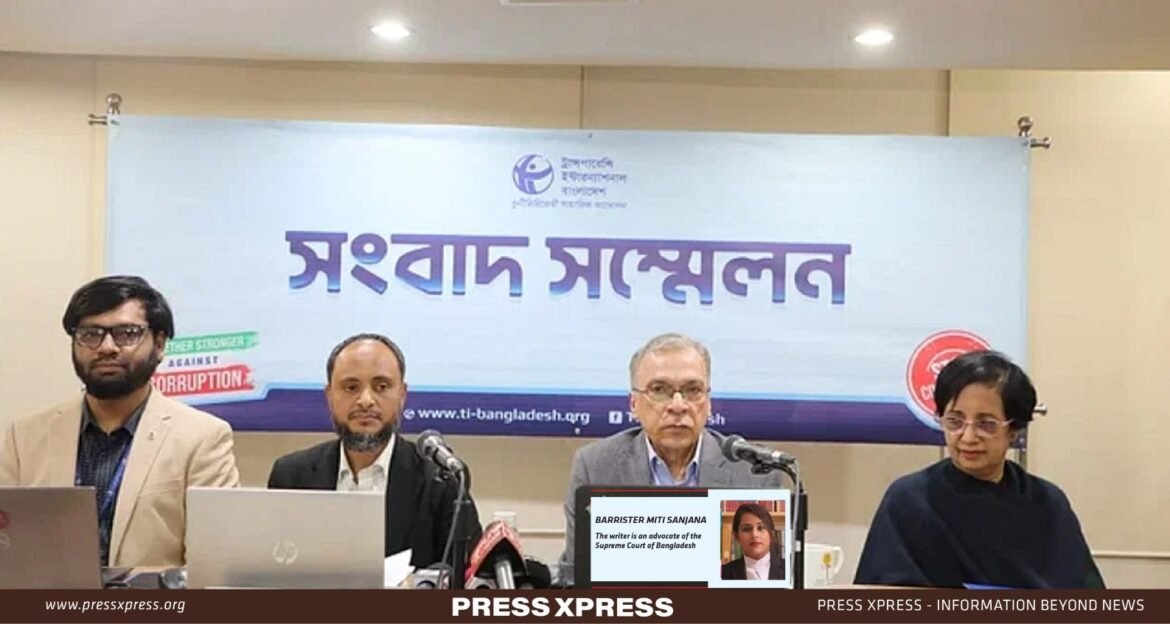Transparency International Bangladesh (TIB) stated in their report that Bangladesh’s 12th national parliamentary election was unfree and non-inclusive. According to the report: The election was not free and inclusive due to mutually contradictory and intransigent positions of the two largest political parties.
TIB’s report on the 12th parliamentary election is not based on facts and it does not reflect public opinion. A fact is a precise detail that is accurate based on verifiable evidence, a first-hand account, or the result of an accepted scientific procedure.
For example, facts include “The Earth revolves around the Sun”. For a statement to be classified as a fact, it must be substantiated through verification and be supported by evidence, figures, records, etc. Facts represent objective reality, whereas opinions are subjective interpretations.
In the TIB report, we can see that the statements are not supported by evidence, figures, or records. Rather it is based on the opinion of the author and the research team and based on vague statements of opinion. Opinions are not facts, instead, they are interpretations or value judgments. They cannot be proven or verified. Opinions are expressions of an individual’s sentiments, convictions, or perspectives, and they may vary from person to person.
I am a lawyer at the Supreme Court of Bangladesh. I would like to state some facts regarding the 12th parliamentary election which are objective information that addresses the questions of who, what, where, when, why, and how.
1. Nomination Scrutiny Process
The EC received a total of 2,716 nomination papers from various political parties and independent candidates, vying for the 300 parliamentary seats. However, after the scrutiny, the EC rejected 731 candidates, or 27% of the total. The EC scrapped the candidacies of Awami League leader Shammi Ahmed (Barisal-4 constituency) for having dual citizenship
2. Election Campaign, Code of Conduct and Punishments
For breaching the code of conduct, EC has shown-caused 762 times of which 300 times were to more than 100 MPs of Awami League. There were also 63 cases filed against candidates or their supporters
3. Drastic Actions taken by EC on Election Day
According to EC, there were reports of irregularities from 140 centres. Polling was suspended in 21 centres in at least 9 constituencies. 42 people were arrested in connection with the irregularities. EC had disqualified Awami League’s candidate, Mustafizur Rahman Chowdhury (Chattogram-16), for threatening law enforcement, marking a historic event in the country’s election history. The returning officer also suspended the results of the Mymensingh-3 (Gouripur) seat due to the suspension of a polling center.
4. 27% to 41% Voter Turnout Controversy
The Election Commission received updated information approximately every two hours. This means that the information of 27% turnout (stated at 3 pm) was at least two hours old. Therefore, the updated information at 4 pm of 41% had a three-hour interval.
It should be also noted that the election morning was exceptionally cold, with temperatures going as low as 13°c in Panchagarh. A large portion of the population waited till noon to cast their votes, updates of which were only tallied later in the day.
5. Awami League Heavyweight defeats
In the Dhaka-19 constituency, Saiful Islam, an independent candidate represented by the truck symbol, triumphed with 84,412 votes, outpacing his closest rival, former State Minister for Disaster Management and Relief Md. Enamur Rahman, the AL candidate, who garnered 56,361 votes.
In Jessore-5, Swapan Bhattacharya, the State Minister of Local Government and two-time MP, who also served as the Local Upazila Chairman, received 72,332 votes but faced defeat at the hands of the independent candidate Yakub Ali, who secured 77,468 votes.
Habiganj-4 experienced the defeat of Adv. Mahbub Ali, the state minister for civil aviation and a two-time MP, despite garnering 69,543 votes, was defeated by an independent candidate, Barrister Syed Sayedul Haque Sumon with a substantial margin of 169,099 votes.
Gazipur-5 witnessed the defeat of Meher Afroz Chumki, the Minister of State for Women and Child Affairs and four-time MP, who garnered 67,783 votes, against the independent candidate Akhtaruzzaman, who secured 82,720 votes.
In Kishoreganj-2, Abdul Kahar Akand, renowned for his role as the investigator in the Bangabandhu assassination case and a former DIG of police, faced defeat with 68,932 votes. An independent candidate named Sohrab Hossain emerged victorious, securing 89,539 votes.
Abdus Sobhan Golap, an influential member of the Awami League Central Committee faced an unexpected defeat in the Madaripur-3 seat. Golap, with 61,971 votes, was surpassed by the relatively unknown Tahmina Begum, who secured 96,633 votes.
In Sunamganj-2, Chowdhury Abdullah Al Mahmood, the younger brother of the current Inspector General of Police (IG), faced defeat with 58,672 votes. An independent candidate, with 67,775 votes, emerged victorious in this electoral contest.
In Kushtia-2, Hasanul Haque Inu, the former Information Minister and three-time MP, a national leader and closest political ally of Awami League, suffered defeat with 92,445 votes against the local leader Kamarul Arefin, who secured 115,799 votes.
The TIB report has provided its report with quantitative outcomes. While the methodology section (Section 3, Page 3) says that they used both qualitative and quantitative data to come to their conclusion, there is no process mentioned of how they came to the quantitative outcome. While the report says that they have sampled 50 constituencies out of 300, there is no mention of how many polling centers they have sampled. There were 42,350 polling centers during the latest election. How can their methodology be effective when they have not disclosed that number?
A report is unbelievable if it is not supported by facts or facts. A report should be supported by evidence to be valid. An unfounded statement is essentially one that has no proof or evidence to back it up. It’s an opinion without any hard facts to support it. An important report cannot be based on speculation, hearsay, or personal belief. Unfortunately, when an institution makes an unfounded statement, it often leads to undesirable results as it’s simply not based on any real facts or evidence.


